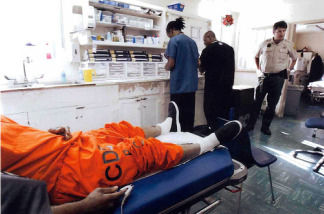Related Topics
Outlaws: Crime in Philadelphia
Even the criminals, the courts and the prisons of this town have a Philadelphia distinctiveness. The underworld has its own version of history.
Right Angle Club 2009
The 2009 proceedings of the Right Angle Club of Philadelphia, beginning with the farewell address of the outgoing president, John W. Nixon, and sadly concluding with memorials to two departed members, Fred Etherington and Harry Bishop.
Philadelphia Medicine (2)
Philadelphia is where medicine began in America
Inside the Big House

|
| Medical care inside a prison |
The Right Angle Club was highly honored recently to be addressed by Peter Binnion, MD, the former Chief of Cardiology at the Pennsylvania Hospital, distinguished librarian of the Shakspere Society, and well-known former Main Line physician. Peter is now, hard to believe, Associate Director of a state prison medical program. One of the members of the audience asked him straight out, "Why are you there?"
At a time when prison medicine is widely, and correctly, regarded as a generally deplorable system, it is hard for the public to understand the sense of duty which impels at least a few of the profession to try to improve matters. And it is particularly difficult for the lay public to understand the attraction for a well-trained academic physician to work in an environment of severely ill patients. In a sense, it's like the old days.
And Peter slyly pointed out, it may be somewhat like the future if we aren't careful. He artfully repeated the anti-medical care harangues which are now commonly issued by various liberal politicians, denouncing the extravagant care we are supposed to provide, and the uncaring attitude toward the uninsured sick. Having resonated with any left-leaning members of the audience, he proceeded to describe what things are like when the government provides the care, and how it feels to observe the limitations of a real bureaucracy. Just for a start, he isn't allowed to call himself a doctor. He's a provider of care. And to go on, not only are the prisoners three to a room designed for two but one-quarter of those without cells, sleep on the bare floor,

|
| Delaware State Prison Patch |
Over ninety percent of the prisoners are taking illicit drugs; their ingenuity in smuggling simply passes belief. What's called drug detoxification among new inmates gets briskly to the goal. Our speaker delicately avoided the disagreeable notion that study after study has shown that illicit drugs in prison are almost invariably smuggled in and sold by the guards. For them, it's just a source of supplemental income, justified in their minds by low pay for unpleasant work. Lots of the prisoners have HIV infection, although not as many as depicted in rumor. Unless a disease is life-threatening, treatment is not encouraged. Hernias are not repaired, for example. And so a physician working in this environment is intended to spend all of his time with life-threatening conditions. Most physicians would shame-facedly have to admit this makes for an exhilarating professional experience, and it is indeed the sort of environment in which post-graduate medical training once took place, almost everywhere. Up until now, Peter had never seen a case of Hepatitis C. In the past two years, he has treated six cases. Diabetes is almost always out of control because it is absolutely forbidden to allow the prisoners to have the needles to give themselves insulin. Sharps, you see, is prohibited.
It's a little disconcerting to be given lectures on how to behave if you are being held hostage, but the fact is that the prisoners universally treat the doctor with great courtesy. You know they are always looking for drugs, and you know they regard the medical system as a soft spot in the security system so it's a good place to launch an escape attempt. But regardless of the motivation, Peter observes at least as much civility in these patients as in the Main Line office. The doctor really doesn't want to know the reasons for imprisonment, and the prisoner certainly doesn't volunteer it, so the topic just doesn't come up.
Three goals are maintained, above all others, by the prison authorities. The suicide rate is regarded as a measure of the prison system, so extreme measures are taken to prevent it, or to prevent suicide from being successful when attempted. There is a very high rate of schizophrenia among the inmates, which probably reflects the deplorable state of psychiatric hospitals following the 1983 Budget Reconciliation Act. The second overriding goal is to protect the guards ("officers") from attack, so that scissors, hypodermics, and things which could remotely be described as a "sharp" are scrupulously sought out and eliminated remorselessly. The final goal, of course, is to prevent escapes, which have become the public measure of whether or not it's a good jail. The precautions taken to prevent, thwart and punish escape attempts hang heavy in the air.
All legislatures hate prisons; they cost too much. Since budget restraints lead to many of the nastiest features of prison life, budget restraints enhance the punishment. How much these two ideas reinforce each other is hard to say, but one thing is clear. Individually, people are pretty decent; collectively, Society is a bum.
Originally published: Friday, August 07, 2009; most-recently modified: Wednesday, May 22, 2019